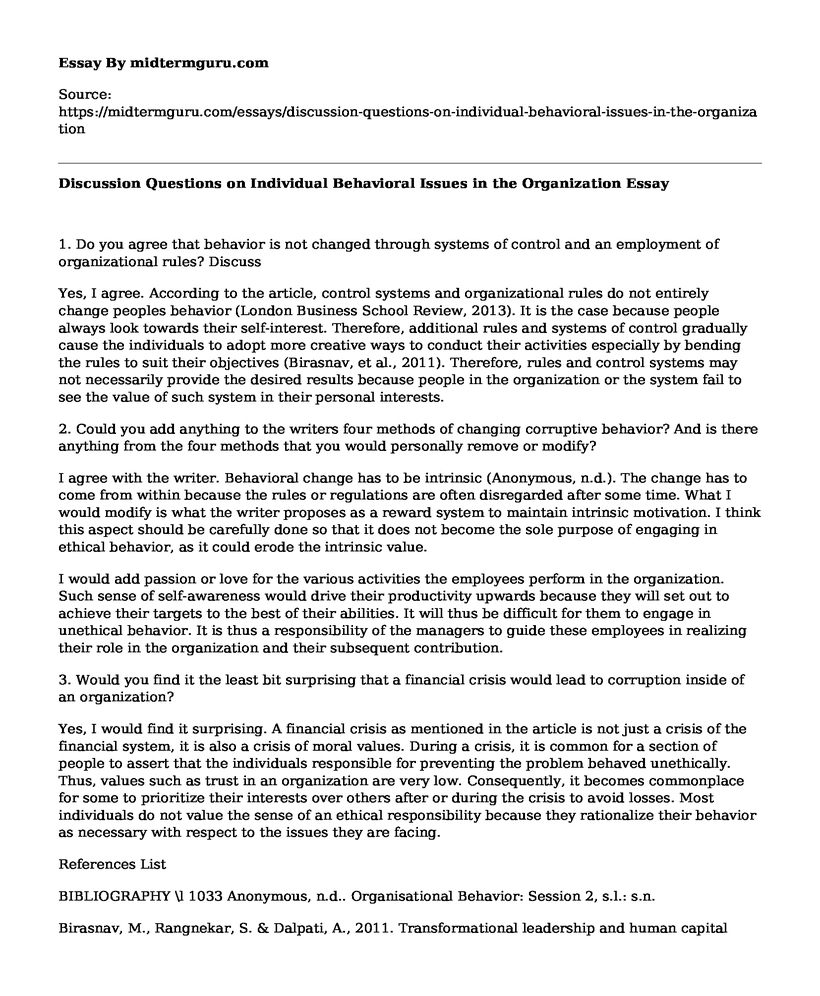1. Do you agree that behavior is not changed through systems of control and an employment of organizational rules? Discuss
Yes, I agree. According to the article, control systems and organizational rules do not entirely change peoples behavior (London Business School Review, 2013). It is the case because people always look towards their self-interest. Therefore, additional rules and systems of control gradually cause the individuals to adopt more creative ways to conduct their activities especially by bending the rules to suit their objectives (Birasnav, et al., 2011). Therefore, rules and control systems may not necessarily provide the desired results because people in the organization or the system fail to see the value of such system in their personal interests.
2. Could you add anything to the writers four methods of changing corruptive behavior? And is there anything from the four methods that you would personally remove or modify?
I agree with the writer. Behavioral change has to be intrinsic (Anonymous, n.d.). The change has to come from within because the rules or regulations are often disregarded after some time. What I would modify is what the writer proposes as a reward system to maintain intrinsic motivation. I think this aspect should be carefully done so that it does not become the sole purpose of engaging in ethical behavior, as it could erode the intrinsic value.
I would add passion or love for the various activities the employees perform in the organization. Such sense of self-awareness would drive their productivity upwards because they will set out to achieve their targets to the best of their abilities. It will thus be difficult for them to engage in unethical behavior. It is thus a responsibility of the managers to guide these employees in realizing their role in the organization and their subsequent contribution.
3. Would you find it the least bit surprising that a financial crisis would lead to corruption inside of an organization?
Yes, I would find it surprising. A financial crisis as mentioned in the article is not just a crisis of the financial system, it is also a crisis of moral values. During a crisis, it is common for a section of people to assert that the individuals responsible for preventing the problem behaved unethically. Thus, values such as trust in an organization are very low. Consequently, it becomes commonplace for some to prioritize their interests over others after or during the crisis to avoid losses. Most individuals do not value the sense of an ethical responsibility because they rationalize their behavior as necessary with respect to the issues they are facing.
References List
BIBLIOGRAPHY \l 1033 Anonymous, n.d.. Organisational Behavior: Session 2, s.l.: s.n.
Birasnav, M., Rangnekar, S. & Dalpati, A., 2011. Transformational leadership and human capital benefits: The role of knowledge management. Leadership & Organizational Development, pp. 32(2), 106-126.
London Business School Review, 2013. Leadership: Breaking the corruption habit. [Online] Available at: http://www.forbes.com/sites/lbsbusinessstrategyreview/2013/11/25/breaking-the-corruption-habit/#16a758e357ba
Cite this page
Discussion Questions on Individual Behavioral Issues in the Organization. (2021, May 28). Retrieved from https://midtermguru.com/essays/discussion-questions-on-individual-behavioral-issues-in-the-organization
If you are the original author of this essay and no longer wish to have it published on the midtermguru.com website, please click below to request its removal:
- Transformational Leadership and Employee Motivation in the Hospitality
- Business Ethics Reflection Paper
- Ethical Decision Making by Individuals in Organizations
- The Clinical Problem of Patient Care Safety and Associated Change - Paper Example
- Essay Sample on Affirmative Action Planning
- Business Decision Making - Essay Sample
- Motivating Employees: An Essential Management Responsibility - Essay Sample







